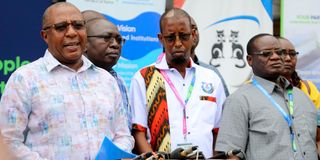Principals sound warning over Grade 10 transition preparedness

The Chairman of Kenya Secondary Schools Heads Association Willy Kuria (left) with other Officials during the start of the 48th Annual Conference for Principals in Mombasa in this photo taken on 23rd June 2025.
Principals of secondary schools have raised concerns about the level of preparedness before the 1.2 million learners currently in Grade 9 transition to senior school in January 2026.
The principals who are meeting for their annual Kenya Secondary Schools Heads Association (Kessha) conference in Mombasa want the government to address retooling of teachers in career pathways, sustainable financing of schools, congestion and learners’ health care insurance under the Social Health Authority (SHA). They also want to be guided on how national schools, which take boarders, will accommodate day scholars.
The principals also want the government to fast-track retooling of teachers who are the curriculum implementers. Last week, the Principal Secretary for Higher Education Beatrice Inyangala said that teachers in secondary schools lack competency in the three pathways for senior school. The pathways are science, technology, engineering and mathematics (STEM), social sciences and arts and sports.
So far, the Teachers Service Commission (TSC) has retooled more than 7,000 school principals. According to data by the commission, since the introduction of the CBE seven years ago, 229,292 primary school teachers, and 75,000 teachers in junior schools have been retooled.
“If we all want this new system of education to be successful, we must ensure teachers are retooled. Education financing is also a major issue. The school fees being paid by parents currently of Sh40,000 for extra-county and Sh53,000 for national schools was fixed in 2015, 10 years ago. It is unsustainable,” said Willy Kuria, the Kessha chairperson and also the chief principal of Muranga High School. He spoke in an exclusive interview with Nation.
He added that inflation has gone up by 46 per cent over the 10-year period and that funding of the education sector is a crucial matter that needs urgent intervention.
The pioneer cohort of the CBE will undertake the inaugural Kenya Junior School Education Assessment in November. After the results are announced, the Ministry of Education will place them in various senior schools. The placement exercise will be based on the choice of pathways, learners' abilities, interests, and career choices.
“The capitation we are supposed to get from the State is not adequate. This second term, we were given around Sh3,000 (per learner) yet we were supposed to get Sh6,600 (per learner). .. In the first term, we were supposed to get Sh11,100 (per learner) but we got around Sh8,000...” said Mr Kuria, also appealing to the teachers’ unions, the Teachers Service Commission (TSC) and the salaries and Remuneration Commission to look into issues of remuneration of teachers.
“The new collective bargaining agreement should be signed this year following the expiry of the previous one which was non-monetary. We must motivate teachers. As managers of schools we are having a hard time dealing with demotivated teachers arising from the issues of remunerations and promotions,” Mr Kuria revealed.
He termed the recent promotions of 25,000 teachers a drop in the ocean as it left out many deserving cases. Among top government officials scheduled to address the principals at the conference include Deputy President Prof Kithure Kindiki, National Treasury and Economic Planning Cabinet Secretary John Mbadi and his Education counterpart Julius Ogamba who is scheduled to address them on financing senior schools.
The conference will look into how the principals will implement competency-based education and governance in schools.
“We have lined up several topics, and we are sure the government officials will address them holistically and give us solutions, especially on sustainable financing of education because CBE will come with its financial challenges. For it to succeed, we need a discourse on financing of education,” he added.
Major discipline issue
Mr Kuria is worried that a directive to mix day scholars and boarders in national schools will cause a major discipline issue and congestion. He warned that the day scholars might be used to traffic unsuitable items into schools and called on the government to rescind the decision.
“Day scholars do not pay tuition fees. How then will you mix them with boarders? We may not afford to have day scholars learn without paying school fees because in boarding schools, we have morning breakfast, 10 o’clock tea, lunch and four o’clock tea, among others. How are we going to manage them? Feed them without imposing any fees?” he asked.
Early this year, the government launched an ambitious drive targeting to enroll 15 million learners in both Early Childhood Education Development centres (ECDEs) primary and secondary schools across the country in the Taifa Care programme.
Initially, only public secondary schools were using EduAfya to access free healthcare services during the Jubilee government while using the National Education Management Information System (NEMIS).
However, President William Ruto rolled out Taifa Care in the SHA programme which also incorporates all learners across the country into the programme.
This will ensure all learners in both public and private schools are enrolled in the health insurance scheme. Community Health Promoters have been enrolling the learners. This differs from the Sh4 billion EduAfya programme medical scheme under the National Health Insurance Fund that only catered to secondary school students learning in public schools registered under NEMIS.
"Initially, in schools we had EduAfya, we also want to discuss the challenges and the way forward on the health system in our schools so that our learners can be taken care of while in our custody," said Mr Kuria.
In the 2025 – 2026 budget, the education sector got the lion’s share with an allocation of over Sh700 billion.


